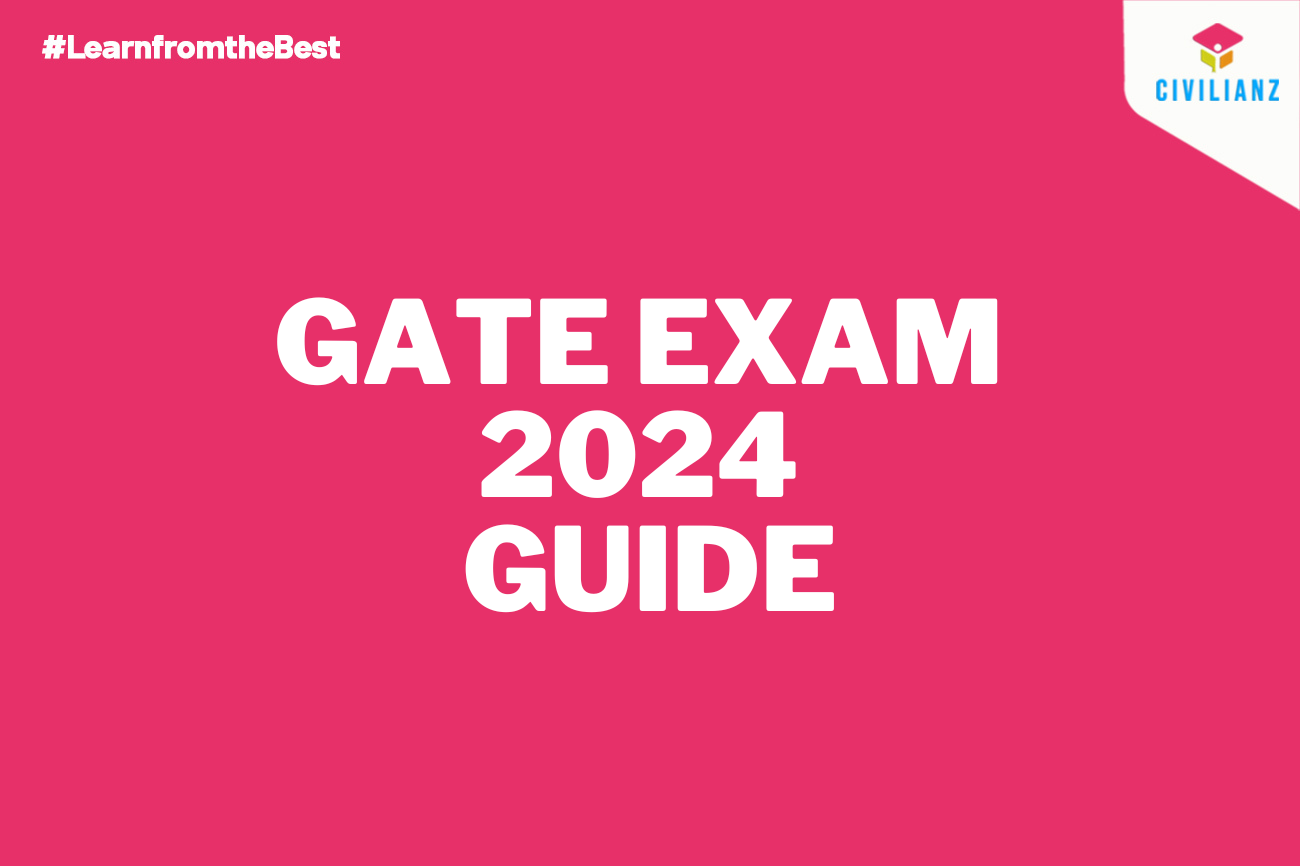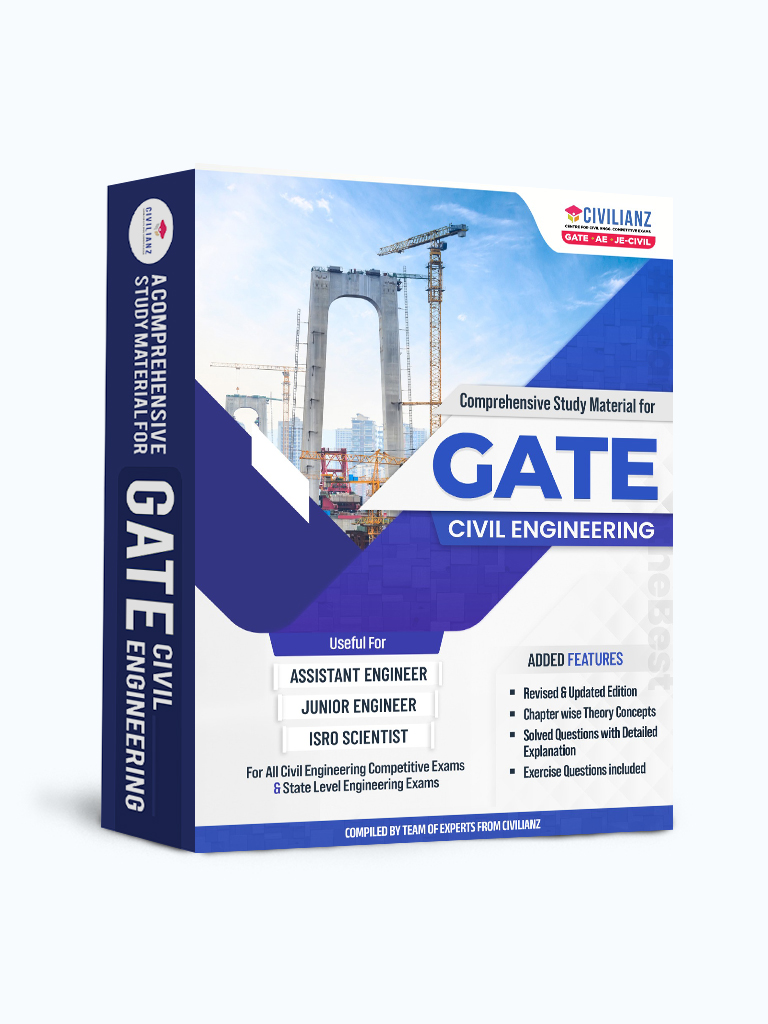
The Graduate Aptitude Test in Engineering (GATE) is a nationwide examination that is collaboratively organized by the Indian Institute of Science (IISc), Bengaluru, along with seven Indian Institutes of Technology (IIT Bombay, IIT Delhi, IIT Guwahati, IIT Kanpur, IIT Kharagpur, IIT Madras, and IIT Roorkee) on behalf of the National Coordination Board (NCB)-GATE, Department of Higher Education, Ministry of Education (MoE), Government of India.
GATE is administered in a computer-based format (CBT) and assesses candidates’ comprehensive understanding of a wide range of undergraduate subjects in Engineering, Technology, Science, and Architecture, as well as both undergraduate and post-graduate level subjects in Humanities and Science. GATE 2024 will include 30 different test papers, spread out over four days. The examination dates for GATE 2024 are scheduled for February 3, 4, 10, and 11, 2024. This examination will be conducted in multiple cities across India and will not be held in centers located outside of India.
GATE EXAM 2024 GUIDE
Embarking on your GATE preparation journey is a crucial step toward a successful career in Civil Engineering, and the Comprehensive Study Material for GATE- Civil Engineering by Civilianz is the ideal companion for this challenging endeavour. This is a guide that is particularly prepared for GATE aspirants. Although the text is mainly designed according to the syllabus of Civil Engineering GATE exam, it also proves beneficial for various other Civil Engineering competitive exams like Assistant Engineer, Junior Engineer, ISRO Scientist, and more.

The updated edition of the book includes theory concepts organized by chapter, concise notes, and solved questions with detailed explanations. Additionally, it features exercise questions to allow aspirants to practice and assess their understanding. The book is a strategic investment in your success. By choosing this study guide, you are opting for a resource that is carefully designed to elevate your preparation, providing the knowledge and confidence needed to excel in your GATE and other competitive exams.
GATE EXAM 2024 ELIGIBILITY CRITERIA
Candidates who are currently studying in the 3rd or higher years of any undergraduate degree program or who have completed any government approved degree program in Engineering/ Technology/ Science/ Architecture/ Humanities are eligible to appear for GATE 2024.
GATE 2024 CIVIL ENGINEERING SYLLABUS
-
CE Civil Engineering
Section 1: Engineering Mathematics
Linear Algebra: Matrix algebra; Systems of linear equations; Eigen values and Eigen vectors.
Calculus: Functions of single variable; Limit, continuity and differentiability; Mean value theorems, local maxima and minima; Taylor series; Evaluation of definite and indefinite integrals, application of definite integral to obtain area and volume; Partial derivatives; Total derivative; Gradient, Divergence and Curl, Vector identities; Directional derivatives; Line, Surface and Volume integrals.
Ordinary Differential Equation (ODE): First order (linear and non-linear) equations; higher order linear equations with constant coefficients; Euler-Cauchy equations; initial and boundary value problems.
Partial Differential Equation (PDE): Fourier series; separation of variables; solutions of one dimensional diffusion equation; first and second order one-dimensional wave equation and two-dimensional Laplace equation.
Probability and Statistics: Sampling theorems; Conditional probability; Descriptive statistics – Mean, median, mode and standard deviation; Random Variables – Discrete and Continuous, Poisson and Normal Distribution; Linear regression.
Numerical Methods: Error analysis. Numerical solutions of linear and non-linear algebraic equations; Newton’s and Lagrange polynomials; numerical differentiation; Integration by trapezoidal and Simpson’s rule; Single and multi-step methods for first order differential equations.
Section 2: Structural Engineering
Engineering Mechanics: System of forces, free-body diagrams, equilibrium equations; Internal forces in structures; Frictions and its applications; Centre of mass; Free Vibrations of undamped SDOF system.
Solid Mechanics: Bending moment and shear force in statically determinate beams; Simple stress and strain relationships; Simple bending theory, flexural and shear stresses, shear centre; Uniform torsion, Transformation of stress; buckling of column, combined and direct bending stresses.
Structural Analysis: Statically determinate and indeterminate structures by force/ energy methods; Method of superposition; Analysis of trusses, arches, beams, cables and frames;
Displacement methods: Slope deflection and moment distribution methods; Influence lines; Stiffness and flexibility methods of structural analysis.
Construction Materials and Management: Construction Materials: Structural Steel – Composition, material properties and behaviour; Concrete – Constituents, mix design, short term and long-term properties. Construction Management: Types of construction projects; Project planning and network analysis – PERT and CPM; Cost estimation.
Concrete Structures: Working stress and Limit state design concepts; Design of beams, slabs, columns; Bond and development length; Prestressed concrete beams.
Steel Structures: Working stress and Limit state design concepts; Design of tension and compression members, beams and beam- columns, column bases; Connections – simple and eccentric, beam-column connections, plate girders and trusses; Concept of plastic analysis – beams and frames.
Section 3: Geotechnical Engineering
Soil Mechanics: Three-phase system and phase relationships, index properties; Unified and Indian standard soil classification system; Permeability – one dimensional flow, Seepage through soils – two – dimensional flow, flow nets, uplift pressure, piping, capillarity, seepage force; Principle of effective stress and quicksand condition; Compaction of soils; One dimensional consolidation, time rate of consolidation; Shear Strength, Mohr’s circle, effective and total shear strength parameters, Stress-Strain characteristics of clays and sand; Stress paths.
Foundation Engineering: Sub-surface investigations – Drilling bore holes, sampling, plate load test, standard penetration and cone penetration tests; Earth pressure theories – Rankine and Coulomb; Stability of slopes – Finite and infinite slopes, Bishop’s method; Stress distribution in soils – Boussinesq’s theory; Pressure bulbs, Shallow foundations – Terzaghi’s and Meyerhoff’s bearing capacity theories, effect of water table; Combined footing and raft foundation; Contact pressure; Settlement analysis in sands and clays; Deep foundations – dynamic and static formulae, Axial load capacity of piles in sands and clays, pile load test, pile under lateral loading, pile group efficiency, negative skin friction.
Section 4: Water Resources Engineering
Fluid Mechanics: Properties of fluids, fluid statics; Continuity, momentum and energy equations and their applications; Potential flow, Laminar and turbulent flow; Flow in pipes, pipe networks; Concept of boundary layer and its growth; Concept of lift and drag.
Hydraulics: Forces on immersed bodies; Flow measurement in channels and pipes; Dimensional analysis and hydraulic similitude; Channel Hydraulics – Energy-depth relationships, specific energy, critical flow, hydraulic jump, uniform flow, gradually varied flow and water surface profiles.
Hydrology: Hydrologic cycle, precipitation, evaporation, evapo-transpiration, watershed, infiltration, unit hydrographs, hydrograph analysis, reservoir capacity, flood estimation and routing, surface run-off models, ground water hydrology – steady state well hydraulics and aquifers; Application of Darcy’s Law.
Irrigation: Types of irrigation systems and methods; Crop water requirements – Duty, delta, evapo-transpiration; Gravity Dams and Spillways; Lined and unlined canals, Design of weirs on permeable foundation; cross drainage structures.
Section 5: Environmental Engineering
Water and Waste Water Quality and Treatment: Basics of water quality standards – Physical, chemical and biological parameters; Water quality index; Unit processes and operations; Water requirement; Water distribution system; Drinking water treatment. Sewerage system design, quantity of domestic wastewater, primary and secondary treatment. Effluent discharge standards; Sludge disposal; Reuse of treated sewage for different applications.
Air Pollution: Types of pollutants, their sources and impacts, air pollution control, air quality standards, Air quality Index and limits.
Municipal Solid Wastes: Characteristics, generation, collection and transportation of solid wastes, engineered systems for solid waste management (reuse/ recycle, energy recovery, treatment and disposal).
Section 6: Transportation Engineering
Transportation Infrastructure: Geometric design of highways – cross-sectional elements, sight distances, horizontal and vertical alignments. Geometric design of railway Track – Speed and Cant. Concept of airport runway length, calculations and corrections; taxiway and exit taxiway design.
Highway Pavements: Highway materials – desirable properties and tests; Desirable properties of bituminous paving mixes; Design factors for flexible and rigid pavements; Design of flexible and rigid pavement using IRC codes
Traffic Engineering: Traffic studies on flow and speed, peak hour factor, accident study, statistical analysis of traffic data; Microscopic and macroscopic parameters of traffic flow, fundamental relationships; Traffic signs; Signal design by Webster’s method; Types of intersections; Highway capacity.
Section 7: Geomatics Engineering
Principles of surveying; Errors and their adjustment; Maps – scale, coordinate system; Distance and angle measurement – Levelling and trigonometric levelling; Traversing and triangulation survey; Total station; Horizontal and vertical curves. Photogrammetry and Remote Sensing – Scale, flying height; Basics of remote sensing and GIS.
-
GA General Aptitude
Verbal Aptitude
Basic English grammar: tenses, articles, adjectives, prepositions, conjunctions, verb-noun agreement, and other parts of speech.
Basic vocabulary: words, idioms, and phrases in context, reading and comprehension, Narrative sequencing.
Quantitative Aptitude
Data interpretation: data graphs (bar graphs, pie charts, and other graphs representing data), 2- and 3-dimensional plots, maps, and tables Numerical computation and estimation: ratios, percentages, powers, exponents and logarithms, permutations and combinations, and series Mensuration and geometry Elementary statistics and probability.
Analytical Aptitude
Logic: deduction and induction, Analogy, Numerical relations, and reasoning
Spatial Aptitude
Transformation of shapes: translation, rotation, scaling, mirroring, assembling, and grouping Paper folding, cutting, and patterns in 2 and 3 dimensions
GATE 2024 EXAM PATTERN
| Examination Mode | The test papers will be in English. Computer Based Test (CBT) [will be conducted at select centers in select cities]. |
| Duration | 3 Hours |
| Number of Subjects (Papers) | 30 |
| Sections | General Aptitude (GA) + Candidate’s Selected Subjects |
| Type of Questions | Candidate’s Selected Subject(s) (a) Multiple Choice Questions (MCQ) (b) Multiple Select Questions (MSQ) and/or (c) Numerical Answer Type (NAT) Questions |
| Questions for testing these abilities | (a) Recall (b) Comprehension (c) Application (d) Analysis & Synthesis |
| Distribution of Marks in all Papers EXCEPT papers AR, CY, DA, EY, GG, MA, PH, ST, XH and XL | General Aptitude: 15 marks Engineering Mathematics**: 13 marks Subject Questions: 72 marks Total: 100 marks (**XE includes Engineering Mathematics section XE-A of 15 marks) |
| Distribution of Marks in papers AR, CY, DA, EY, GG, MA, PH, ST, XH and XL | General Aptitude: 15 marks Subject Questions: 85 marks Total: 100 marks |
| Marking Scheme | Questions carry 1 mark or 2 marks |
| Negative Marking | For a wrong answer chosen in an MCQ, there will be negative marking. For a 1-mark MCQ, 1/3 mark will be deducted for a wrong answer. For a 2-mark MCQ, 2/3 mark will be deducted for a wrong answer. There is no negative marking for wrong answer(s) to MSQ or NAT questions. There is no partial marking in MSQ. |
GATE CE PREVIOUS YEAR CUT OFF
| Branch | GEN | OBC/EWS | SC/ST/PwD |
| CE | 26.6 | 23.9 | 17.7 |
Civilianz stands as the top GATE coaching center in Kerala, specializing in preparing students for various Civil Engineering Competitive exams. Our comprehensive coaching program covers a range of exams, including GATE – Civil, Assistant Engineer, Assistant Professor Civil, Lecturer in Polytechnic, Junior Engineer- Civil, Overseer, Tracer, and other similar civil engineering competitions.
GATE 2024 – Civil പരീക്ഷയ്ക്ക് ഇനി ചുരുങ്ങിയ സമയം മാത്രം
ഇനിയുള്ള ദിവസങ്ങളിൽ smart ആയി, effective ആയി കൃത്യമായ strategies follow ചെയ്ത് പഠിക്കാനായി Civilianz ന്റെ Intensive Online Crash Course
Course features 





A journey of thousand miles begins with a single step
We are happy you have visited our website. Our teachers are working hard to get the new course up and running. We will launch courses very soon!
കൂടുതൽ വിവരങ്ങൾക്ക് contact ചെയ്യാം 
CIVILIANZ SOCIAL MEDIA PLATFORMS
Our Social media platforms are exclusively for Civil Engineering students, job candidates, teachers and all those who have passion for Civil Engineering.
You will get
-
Civil engineering quiz and rewards
-
Regular job notifications
-
Exam notifications
-
PDF notes
-
Study tips
-
Civil related discussion and all in this group.
JOIN OUR SOCIAL MEDIA PLATFORMS
#learnfromthebest













Leave a comment